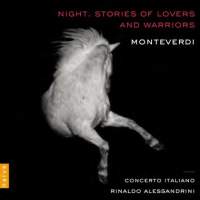Texte paru dans: / Appeared in: |
|
|
Outil de traduction ~ (Très approximatif) |
|
|
Reviewer: James
V. Maiello
Rinaldo Alessandrini and
Concerto Italiano have garnered high praise for their spirited recordings of
music by Bach, Monteverdi, Vivaldi, and others, so it should come as no
surprise that the performances on this release, Night. Stories of Lovers and
Warriors, are dynamic but still nuanced. In building a program around the
themes of night and lovers/warriors (clearly inspired by Monteverdi’s Eighth
Book of Madrigals), Alessandrini has tapped into the soul of 17th-century
Italian music, a synergy of drama, Affekt, and contrast. As a literary and
dramatic topos, night invited a suspension of societal mores and roles, as
well as a hospitable environment for clandestine affairs and poetic
reflection. It is into this world that Alessandrini invites us.
The disc opens with a sublime
reading of the Sinfonia from act III of L’Orfeo, during which Orpheus
travels to the underworld, charms Caron, and crosses the river Styx. The
orchestra is confidently placid, each chord shimmering in its clarity and
warmly enveloping. This is a brilliant choice with which to begin the
program, executed in such a way that it washes away the outside world and
immerses listeners in Monteverdi’s night. The hypnotic homophony of Hor
che’l ciel e la terra follows immediately, each voice balanced
perfectly, the texture lush and transparent. Here and throughout the disc,
Concerto Italiano set the gold standard for rendering Monteverdi’s cadences
and knotty dissonances. They lean in just enough to make each clash of tones
viscerally torturous, but the ensemble never cross the line into garishness.
The Combattimento di
Tancredi e Clorinda is the centerpiece of the program, and it is
representative of the quality of all the performances on this disc. More to
the point, this is without a doubt the best Combattimento I have ever
heard. As I listened for the first time, there were moments where I
legitimately forgot to breathe or was left slack-jawed. Raffaele Giordani is
an utterly captivating narrator, delivering a dramatic and totally committed
performance that sometimes diverts attention from his beautiful voice and
expert technique. Giordani’s phrasing and embellishments reflect a fully
internalized understanding of monodic conventions and 17th-century
Italianate style, and he has the skills to make all this sound completely
natural. Clorinda (Monica Piccinini) and Tancredi (Matteo Bellotto) are
similarly impressive as a supporting cast, allowing for a truly multifaceted
drama instead of a one-man show.
Like Mozart’s opera
orchestras, Concerto Italiano amplifies the words and emotions of the
Combattimento’s characters, providing support and musical commentary.
The orchestra is a marvel here, agile and chameleonic. One minute, the sound
and blend of the strings are liquid, the next the orchestra is gritty and
percussive, all in the service of those pillars of Baroque aesthetics,
emotion and contrast. Alessandrini is an erudite and sensitive interpreter;
under his direction the strings are far more than the sum of their parts.
Tempos are brisk, exciting but not hasty; slower sections never feel
indulgent. He seems to know exactly what will be not just appropriate but
also transcendent. The players seem equally happy to oblige.
Lamenta della ninfa
remains one of Monteverdi’s most popular and enduring madrigals. Here, the
vocalists make the most out of Gesualdo-like twists and turns, grounded by
Alessandrini’s harpsichord continuo. Occasionally, the close harmonies sound
less than distinct, but these moments are few and fleeting. The theorbo
takes over some of the harmonic foundation, which is a welcome timbral
change and also recalls several movements of the 1610 Vespers.
Another highlight of the disc is a resplendent reading of Al lume delle
stelle (from the Seventh Book of Madrigals). It is by turns tender and
enthusiastic, subdued and dramatic, but always controlled impeccably. The
remainder of the program consists of madrigals and sinfonias, all of which
follow the pattern of flawless execution, perceptive musicality, and
stylistically idiomatic interpretations. Throughout, the recording and
mixing is simply exquisite. This is truly an extraordinary achievement, exactly the way I dream of hearing Monteverdi’s music performed. Alessandrini and Concerto Italiano strike an ideal balance between the restrained and the dramatic. It takes exceptional technical skill and discipline to be free enough to make music this way. One cannot listen to this recording without feeling deep professional respect for Alessandrini and all the musicians. They are fearless, but not foolish, filling the music with all of life’s joys and vicissitudes. These are inspired performances, intelligent and expressive. I will be surprised if this disc does not become a classic in pretty short order. | |
|
|
|
|
|
|
|
Cliquez l'un ou l'autre
bouton pour découvrir bien d'autres critiques de CD |
|




